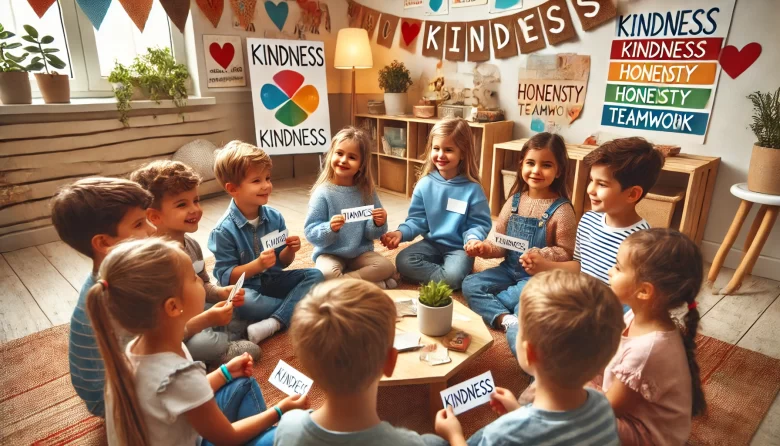Teaching children important values such as kindness, honesty, cooperation, and respect is essential for their emotional and social development. While conversations about values are helpful, play is one of the most effective ways for children to learn and internalize these lessons. Through games, role-playing, and storytelling, children can experience moral lessons in a natural, engaging way.
In this article, we’ll explore why play is a powerful tool for teaching values, along with fun and practical activities to reinforce these life lessons at home.
Why Is Play an Effective Way to Teach Values?
Children learn best through hands-on experiences. When they engage in play, they:
- Practice social interactions in a safe environment.
- Develop problem-solving skills as they navigate different situations.
- Experience emotions such as fairness, empathy, and gratitude firsthand.
- Learn the consequences of their actions in a playful and non-threatening way.
By incorporating values into everyday play, parents and educators can help children develop strong moral foundations while having fun.
Key Values That Can Be Taught Through Play
Kindness and Empathy
Kindness is one of the most fundamental values children can learn. Through play, they can practice recognizing and responding to the feelings of others.
Activities to Teach Kindness and Empathy:
- Kindness Role-Playing – Act out scenarios where one child helps another who is feeling sad or left out.
- Compliment Circle – Have children sit in a circle and take turns giving each other kind compliments.
- “Secret Kindness Missions” – Assign children small tasks, such as helping a sibling, sharing a toy, or saying something nice to a friend.
Honesty and Integrity
Children need to learn that honesty builds trust and strong relationships. Games that involve truth-telling help reinforce this value.
Activities to Teach Honesty:
- Two Truths and a Lie – A fun game where children tell two true statements and one false one, and others guess which is the lie. This opens discussions about honesty.
- Storytelling About Honesty – Read books or make up stories where characters face dilemmas about telling the truth. Discuss the consequences of honesty and dishonesty.
- “What Would You Do?” Game – Present moral dilemmas (e.g., “What would you do if you accidentally broke something?”) and discuss possible responses.
Cooperation and Teamwork
Working together towards a common goal helps children understand the importance of teamwork and collaboration.
Activities to Teach Cooperation:
- Building Challenges – Have children work together to build a tower with blocks or LEGOs. Emphasize teamwork over competition.
- Group Art Projects – Assign different sections of a large drawing to different children so they must collaborate to complete it.
- Obstacle Courses – Set up a mini obstacle course where children must help each other complete tasks.
Responsibility and Accountability
Teaching children responsibility helps them develop independence and a sense of ownership over their actions.
Activities to Teach Responsibility:
- Toy Cleanup Race – Turn cleaning up into a fun challenge to encourage responsibility for their space.
- Pet or Plant Care – Assign children tasks like feeding a pet or watering a plant to instill responsibility.
- Responsibility Chart – Create a reward-based system where children track and complete daily tasks.
Gratitude and Appreciation
Teaching gratitude helps children focus on what they have rather than what they lack, fostering a positive mindset.
Activities to Teach Gratitude:
- Gratitude Jar – Have children write down one thing they are grateful for each day and place it in a jar.
- “Thank You” Notes – Encourage children to make cards for teachers, family members, or friends to show appreciation.
- Daily Gratitude Reflection – During dinner or bedtime, ask children to share one thing they were grateful for that day.
Fairness and Justice
Understanding fairness helps children navigate social interactions and treat others with respect.
Activities to Teach Fairness:
- Turn-Taking Games – Play board games where children must wait for their turn and follow rules.
- Fairness Debates – Present scenarios where fairness is questioned (e.g., “Should everyone get the same prize, even if some worked harder?”) and discuss perspectives.
- Storytelling About Fairness – Read books about fairness and ask children how they would handle similar situations.
Patience and Self-Control
Learning patience helps children develop impulse control and understand delayed gratification.
Activities to Teach Patience:
- Timed Challenges – Play games where children must wait for a signal before acting (e.g., “Red Light, Green Light”).
- Baking Together – Teach patience by letting children measure ingredients and wait for food to cook.
- Puzzle Games – Completing puzzles teaches patience, persistence, and delayed gratification.
Encouraging Value-Based Play at Home
Be a Role Model
Children learn by example. Demonstrate values in your everyday actions—be honest, show kindness, and practice gratitude.
Praise Positive Behavior
Acknowledge when children display values in their play:
- “I love how you helped your friend when they were feeling sad.”
- “That was so responsible of you to clean up your toys without being asked.”
Create Opportunities for Play That Encourages Values
Provide games, books, and activities that reinforce moral lessons. Encourage pretend play that includes caring roles like doctors, firefighters, or teachers.
Ask Reflective Questions After Play
After a game, ask questions to reinforce values:
- “How did it feel when you helped your teammate?”
- “What did you learn about fairness during the game?”
Foster a Growth Mindset
Help children understand that values develop over time and through practice. Encourage them to keep trying, even when learning a value is difficult.
Final Thoughts
Teaching values through play is a powerful way to help children develop essential life skills in a fun and engaging way. By integrating kindness, honesty, cooperation, and patience into daily activities, parents and caregivers can provide children with the foundation they need to grow into thoughtful, responsible, and compassionate individuals.
With simple games, role-playing, and everyday interactions, values become more than just lessons—they become a natural part of a child’s world.




